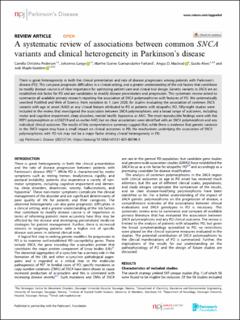| dc.contributor.author | Pedersen, Camilla C | |
| dc.contributor.author | Lange, Johannes | |
| dc.contributor.author | Førland, Marthe Gurine | |
| dc.contributor.author | Macleod, Angus D. | |
| dc.contributor.author | Alves, Guido Werner | |
| dc.contributor.author | Maple-Grødem, Jodi | |
| dc.date.accessioned | 2021-07-07T08:12:02Z | |
| dc.date.available | 2021-07-07T08:12:02Z | |
| dc.date.created | 2021-07-05T18:09:14Z | |
| dc.date.issued | 2021-07 | |
| dc.identifier.citation | Pedersen, C.C., Lange, J., Førland, M.G.G. et al. (2021) A systematic review of associations between common SNCA variants and clinical heterogeneity in Parkinson’s disease. npj Parkinson's Disease. 7, 54. | en_US |
| dc.identifier.issn | 2373-8057 | |
| dc.identifier.uri | https://hdl.handle.net/11250/2763663 | |
| dc.description.abstract | There is great heterogeneity in both the clinical presentation and rate of disease progression among patients with Parkinson’s disease (PD). This can pose prognostic difficulties in a clinical setting, and a greater understanding of the risk factors that contribute to modify disease course is of clear importance for optimizing patient care and clinical trial design. Genetic variants in SNCA are an established risk factor for PD and are candidates to modify disease presentation and progression. This systematic review aimed to summarize all available primary research reporting the association of SNCA polymorphisms with features of PD. We systematically searched PubMed and Web of Science, from inception to 1 June 2020, for studies evaluating the association of common SNCA variants with age at onset (AAO) or any clinical feature attributed to PD in patients with idiopathic PD. Fifty-eight studies were included in the review that investigated the association between SNCA polymorphisms and a broad range of outcomes, including motor and cognitive impairment, sleep disorders, mental health, hyposmia, or AAO. The most reproducible findings were with the REP1 polymorphism or rs356219 and an earlier AAO, but no clear associations were identified with an SNCA polymorphism and any individual clinical outcome. The results of this comprehensive summary suggest that, while there is evidence that genetic variance in the SNCA region may have a small impact on clinical outcomes in PD, the mechanisms underlying the association of SNCA polymorphisms with PD risk may not be a major factor driving clinical heterogeneity in PD. | en_US |
| dc.language.iso | eng | en_US |
| dc.publisher | Springer Nature Switzerland AG | en_US |
| dc.rights | Navngivelse 4.0 Internasjonal | * |
| dc.rights.uri | http://creativecommons.org/licenses/by/4.0/deed.no | * |
| dc.subject | Parkinson | en_US |
| dc.subject | SNCA | en_US |
| dc.title | A systematic review of associations between common SNCA variants and clinical heterogeneity in Parkinson's disease | en_US |
| dc.type | Peer reviewed | en_US |
| dc.type | Journal article | en_US |
| dc.description.version | publishedVersion | en_US |
| dc.rights.holder | © The Author(s) 2021 | en_US |
| dc.subject.nsi | VDP::Medisinske Fag: 700::Klinisk medisinske fag: 750::Nevrologi: 752 | en_US |
| dc.source.volume | 7 | en_US |
| dc.source.journal | NPJ Parkinson's Disease | en_US |
| dc.identifier.doi | 10.1038/s41531-021-00196-5 | |
| dc.identifier.cristin | 1920355 | |
| dc.source.articlenumber | 54 | en_US |
| cristin.ispublished | true | |
| cristin.fulltext | original | |
| cristin.qualitycode | 1 | |

